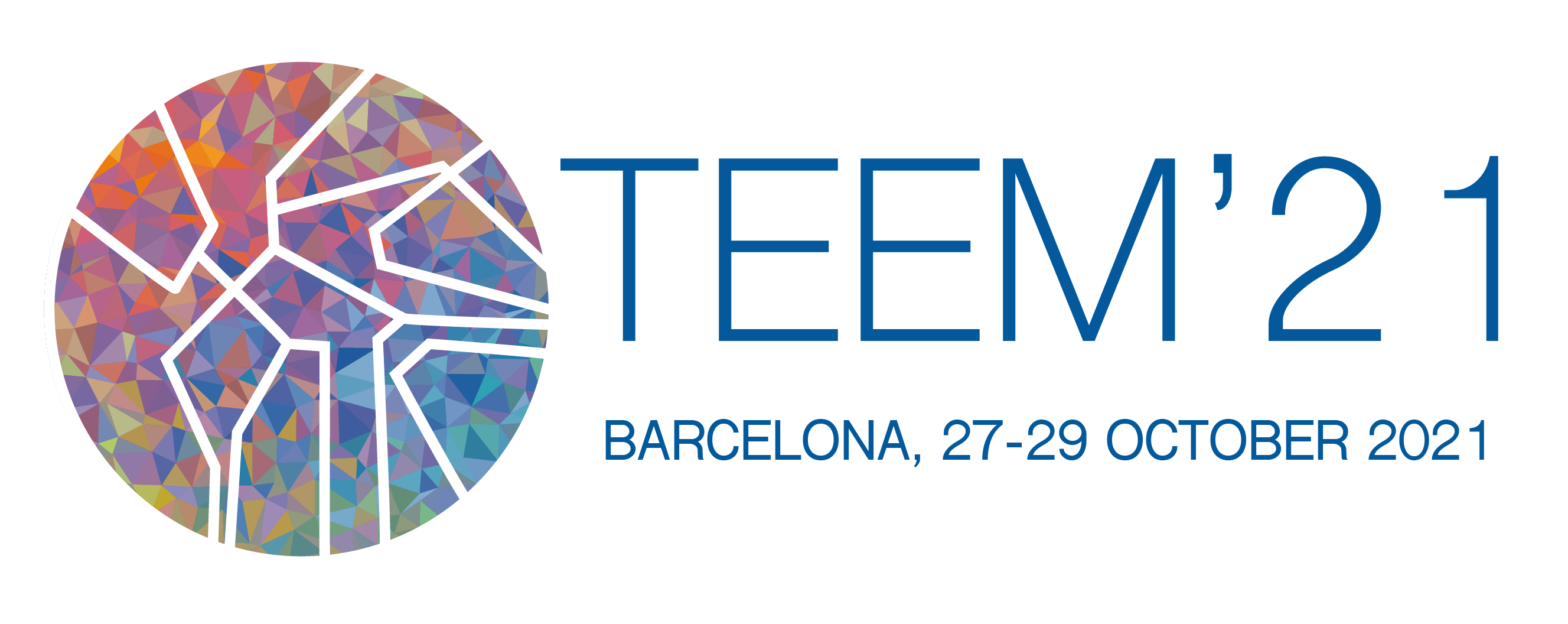Presentation
The track on Smart Learning within the 2021 International Conference Technological Ecosystems for Enhancing Multiculturality (TEEM ’21) aims to provide a forum for researchers, professionals and companies for the presentation and discussion on the application to learning of the advances in Artificial Intelligence in the broadest sense. The main objective is to know how intelligent systems impact human learning from different points of view. To this end, in this track, we promote innovative ideas, theories, models, approaches, technologies, systems, projects, best practices, case studies, products, transference experiences and ethical studies in the area of smart learning. Submissions should present empirical and/or theoretical advances in smart platforms, smart analytics, smart tutoring, smart evaluation, smart strategies, collaborative smart learning, modelling for smart learning, smart interfaces, smart spaces and ethical and legal considerations in smart learning environments, syllabus for smart learning. All submissions will be subject to peer-review.
Topics
The Smart Learning track solicits papers particularly (but not exclusively) in the following lines of research and application: Smart teaching-learning process:
- Smart Learning platforms: platforms for adaptive and personalized learning
- Smart Learning analysis: Learning Analytics, Educational Data Mining for Smart Learning
- Smart Learning tutoring: learning activity generation, problem generation and selection, feedback generation, conversational systems.
- Smart Learning evaluation: automatic evaluation, automatic feedback, learning style assessment.
- Smart Learning strategies: instructional design for Smart Learning, learning activity design, gamification, educational games.
- Collaborative Smart Learning: collaborative platforms for learning, social networks.
- Modelling for Smart Learning: domain models, student models, knowledge models and representation, community models, ontologies for Smart Learning.
- Smart interfaces for learning: virtual and augmented reality, natural language processing and speech technologies, tangible interfaces and wearables.
- Smart spaces: smart classrooms, smart universities, smart schools, ubiquitous learning.
- Ethical and legal considerations in Smart Learning environments: students, teachers, educational institutions, governments, companies.
- Syllabus for Smart Learning: educational offer design, students active role, socio/economic perspective integration, metrics for continuous improvement.
Track Instructions and Program (Thursday 28th, F2F-Hybrid, 15.30-17.00, local time, SALA DE GRAUS, floor 1)
The track will be conducted as an hybrid approach, with papers being presented online or face-to-face, upon authors’ choice. Both F2F or virtual should consider 10 min/5 min presentation/questions. Afterwards, there will be a final discussion of about 20-25 minutes.
The order of the presentations will be:
- ID 84: Reconfigurable and Ergonomic Smart Desk – An EPS@ISEP 2021 Project
- ID 22: Heuristic evaluation of a mentoring portal
- ID 79: Adaptive Learning of Reading Comprehension: Innovation with Technologies for Middle Education
- ID 132: Findings on student miss-conceptions when performing oral exams
Track Scientific Committee
Rafael Molina Carmona (Universidad de Alicante) – Chair
Carlos Villagrá Arnedo (Universidad de Alicante) – Chair
Antonio Fernández Martínez (University of Almería, Spain)
Carina González González (University of La Laguna, Spain)
Antonio Jimeno Morenilla (University of Alicante, Spain)
Faraón Llorens Largo (University of Alicante, Spain)
David López Álvarez (Polytechnic University of Cataluña, Spain)
Gina Susana Mejía Madrid (Central University of Ecuador)
Doris Meza Bolaños (Central University of Ecuador, Ecuador)
Agustín Pérez Martín (Miguel Hernández University, Spain)
María Luisa Pertegal Felices (University of Alicante,, Spain)
José Antonio Piedra Fernández (University of Almería, Spain)
Alejandro Rabasa Dolado (Miguel Hernández University, Spain)
Francisco Xavier Valverde Alulema (Central University of Ecuador, Ecuador)
Daniel Villar Onrubia (Coventry University, UK)
Miguel Zapata Ros (University of Murcia, Spain)
